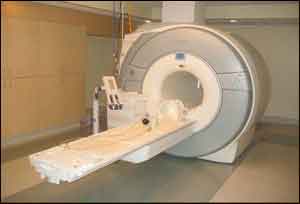- Home
- Editorial
- News
- Practice Guidelines
- Anesthesiology Guidelines
- Cancer Guidelines
- Cardiac Sciences Guidelines
- Critical Care Guidelines
- Dentistry Guidelines
- Dermatology Guidelines
- Diabetes and Endo Guidelines
- Diagnostics Guidelines
- ENT Guidelines
- Featured Practice Guidelines
- Gastroenterology Guidelines
- Geriatrics Guidelines
- Medicine Guidelines
- Nephrology Guidelines
- Neurosciences Guidelines
- Obs and Gynae Guidelines
- Ophthalmology Guidelines
- Orthopaedics Guidelines
- Paediatrics Guidelines
- Psychiatry Guidelines
- Pulmonology Guidelines
- Radiology Guidelines
- Surgery Guidelines
- Urology Guidelines
MRI-Guided Biopsy highly effective in prostrate cancer detection, finds study

Magnetic Resonance Imaging (MRI)-Guided Biopsy (MRGB) is highly effective in prostate cancer detection and subsequent definitive treatment across common clinical scenarios revealed a study published in the American Journal of Roentgenology.
A Magnetic Resonance Imaging guided biopsy is an emerging technology with the promise of improving cancer detection rates, increasing the accuracy of pathological grading, and potentially decreasing the number of biopsy cores taken. The current study aims at ascertaining the impact of direct Magnetic Resonance Imaging Guided Biopsy prostate cancer detection and management.
To check the effectiveness of the technology the authors retrospectively identified 127 patients with unknown or untreated prostate cancer with a Gleason score of 6 who underwent direct MRI-guided biopsy of the prostate at our institution between August 2013 and January 2018, after initial multiparametric endorectal MRI examination revealed one or more Prostate Imaging Reporting and Data System (PI-RADS or PI-RADSv2) category 4 or 5 target lesion. All available medical and imaging records were reviewed to determine pertinent clinical details, biopsy findings, and post-biopsy management.
Key findings
- The mean patient age was 68 years.
- Findings from MRI-guided biopsy were positive for 93 of 127 patients (73%), with prostate cancer of Gleason score of 7 or higher diagnosed in 84 of these 93 patients (90%).
- When stratified by clinical scenario, the rate of positive biopsy findings was 66% (57/86) for patients who had negative findings from one or more prior transrectal ultrasound-guided biopsies, 83% (10/12) for biopsy-naive patients, and 90% (26/29) for patients undergoing active surveillance.
- Overall, 90 of 127 patients received a new or upgraded diagnosis of prostate cancer, and 57 of these 90 patients (63%) proceeded to receive treatment with prostatectomy, radiation, or androgen deprivation therapy.
"The results of this study suggest that direct MRI-guided biopsy is associated with high rates of significant prostate cancer detection and subsequent definitive treatment across common clinical scenarios and should be considered an important supplementary diagnostic tool in the appropriate setting." the authors wrote.
For further reference, click on the link

Disclaimer: This site is primarily intended for healthcare professionals. Any content/information on this website does not replace the advice of medical and/or health professionals and should not be construed as medical/diagnostic advice/endorsement or prescription. Use of this site is subject to our terms of use, privacy policy, advertisement policy. © 2020 Minerva Medical Treatment Pvt Ltd